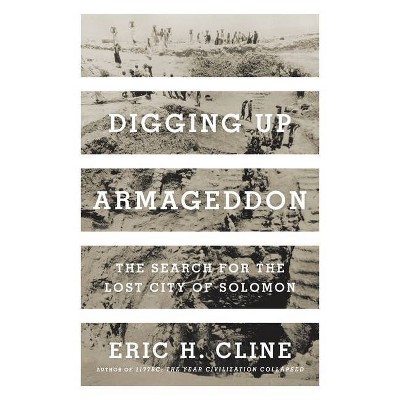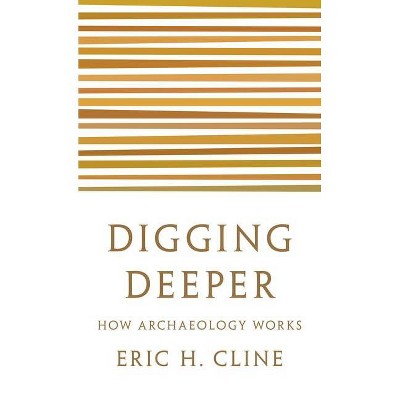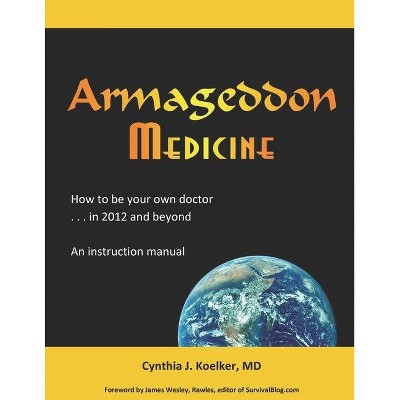Digging Up Armageddon - by Eric H Cline (Hardcover)

Similar Products
Products of same category from the store
AllProduct info
<p/><br></br><p><b> About the Book </b></p></br></br>"In 1925 a team of archaeologists was sent by famed archaeologist James Henry Breasted, the Director of the Oriental Institute of the University of Chicago, to search for the city that King Solomon built in the tenth century BCE. These excavations are rightfully famous for the light they shed on one of the most important cities in biblical times: the ancient city of Megiddo, in Israel, the site of Armageddon. The books and articles that the original participants published are still used, and debated, by archaeologists working in the region today. However, these scholarly publications provide only a small window into the daily activities of the team members and the stories behind their amazing discoveries. Using a treasure trove of other writing - including more than three decades' worth of letters, cablegrams, cards, and diaries, archaeologist and historian Eric Cline, who spent twenty years digging at Megiddo himself, brings the Chicago excavators and their discoveries to life situating them against the backdrop of the Great Depression in the United States as well as the growing troubles and tensions in British Mandate Palestine. Their story, as recounted by Cline, often reads more like melodrama than dry archaeological report and provides a unique a glimpse of the internal workings of a dig in the early years of biblical archaeology. In the course of telling their story, Cline gives readers the full picture of an archaeological site from its first discoveries to its most recent excavations placing it all in the larger scheme of the rise and fall of civilizations, from the Neolithic Revolution through the Romans"--<p/><br></br><p><b> Book Synopsis </b></p></br></br><p><b>A vivid portrait of the early years of biblical archaeology from the acclaimed author of <i>1177 B.C.: The Year Civilization Collapsed</i></b> <p/>In 1925, James Henry Breasted, famed Egyptologist and director of the Oriental Institute at the University of Chicago, sent a team of archaeologists to the Holy Land to excavate the ancient site of Megiddo--Armageddon in the New Testament--which the Bible says was fortified by King Solomon. Their excavations made headlines around the world and shed light on one of the most legendary cities of biblical times, yet little has been written about what happened behind the scenes. <i>Digging Up Armageddon</i> brings to life one of the most important archaeological expeditions ever undertaken, describing the site and what was found there, including discoveries of gold and ivory, and providing an up-close look at the internal workings of a dig in the early years of biblical archaeology. <p/>The Chicago team left behind a trove of writings and correspondence spanning more than three decades, from letters and cablegrams to cards, notes, and diaries. Eric Cline draws on these materials to paint a compelling portrait of a bygone age of archaeology. He masterfully sets the expedition against the backdrop of the Great Depression in America and the growing troubles and tensions in British Mandate Palestine. He gives readers an insider's perspective on the debates over what was uncovered at Megiddo, the infighting that roiled the expedition, and the stunning discoveries that transformed our understanding of the ancient world. <p/><i>Digging Up Armageddon</i> is the enthralling story of an archaeological site in the interwar years and its remarkable place at the crossroads of history.</p><p/><br></br><p><b> Review Quotes </b></p></br></br><br>[A] diligent, clear, and engaging guide through the individuals, relationships, and (more or less) serendipitous events that shaped one of the most influential excavations. . . . Part biography and part history, Cline's <i>Digging Up Armageddon</i> is an exemplary work of scholarship and story-telling that will entertain and inform scholars and interested nonexperts alike.<b>---C. A. Strine, <i>Palestine Exploration Quarterly</i></b><br><br>[Cline] writes with the deft surety of someone familiar with both the site and its archive . . . . What makes [<i>Digging Up Armageddon</i>]<i> </i>such a smart historical treatment of Megiddo is Cline's nuanced examination of how labor, privilege, politics, and capitalism underscored much of the archaeology done in the United States and Europe in the early to mid-20th century.<b>---Lydia Pyne, <i>Los Angeles Review of Books</i></b><br><br>Enjoyable reading . . . riveting.<b>---Amanda Borschel-Dan, <i>Times of Israel</i></b><br><br>It's really quite amazing how he pulls it off--Cline has written a book deeply-imbued with scholarship, an in-depth look at the history and archaeology not just of the expedition at Megiddo, but of the whole Near Eastern region and ancient Israel. . . . So vivid is Cline's telling of the story that readers might be forgiven for finding the personal dimension just as interesting as the archaeology. Anyone who thought that archaeologists were just boring people digging up ancient relics which were of no interest to anyone outside their own field, will be quickly disabused of such a notion.<b>---John Butler, <i>Asian Review of Books</i></b><br><br>Like the best tales from the golden age of archaeology, <i>Digging Up Armageddon </i>combines the grandeur of ancient history, the currency of modern fame and the cast of a malarial soap opera.<b>---Dominic Green, <i>The Spectator</i></b><br><br>Absolutely fascinating.<b>---Paul Zimansky, <i>Times Literary Supplement</i></b><br><br>If it is thrills, spills and devious political machinations of past excavations that take your fancy, why not check out Eric Cline's new book. . . . This is the story about Megiddo that they <i>didn't</i> want you to know.-- "Anglo-Israel Archaeological Society"<br><br>If you love to read about crossroads of history, are fascinated by the years between wards and well beyond, and really just like a good story, this is the book to begin that journey.<b>---Elaine Holden, <i>Monadnock Ledger-Transcript</i></b><br><br>Engaging.-- "Moment Magazine"<br><br>Cline writes with wry insight into human nature and a saving sense of humour.<b>---Patrick Madigan, <i>Heythrop Journal</i></b><br><br>[Cline] has placed the project in the context of its times.<b>---Neil Faulkner, <i>Minerva</i></b><br><br>A fascinating read. . . . So detailed is [Cline's] account of those involved that the book reads better than many a modern novel.<b>---Peter Costello, <i>Irish Catholic</i></b><br><br>An original and lively study that skilfully mixes archaeology with personalities, and politics with culture, science and technology.<b>---Andrew Robinson, <i>Nature</i></b><br><br>At the time this massive dig was undertaken, it was criticised for high costs and never-ending delays. Cline celebrates the high points, but he also exposes the mission's failures.<b>---Sam Waters, <i>Current World Archaeology</i></b><br><p/><br></br><p><b> About the Author </b></p></br></br><b>Eric H. Cline</b> is professor of classics and anthropology and director of the Capitol Archaeological Institute at George Washington University. His many books include <i>Three Stones Make a Wall: The Story of Archaeology</i> and <i>1177 B.C.: The Year Civilization Collapsed</i> (both Princeton). He lives in Rockville, Maryland. Twitter @digkabri
Price History
Cheapest price in the interval: 28.49 on October 22, 2021
Most expensive price in the interval: 28.49 on November 8, 2021
Price Archive shows prices from various stores, lets you see history and find the cheapest. There is no actual sale on the website. For all support, inquiry and suggestion messagescommunication@pricearchive.us







![Armageddon [LP] - VINYL](https://pisces.bbystatic.com/image2/BestBuy_US/images/products/1745/17450599_sa.jpg)
![Armageddon [LP] - VINYL](https://pisces.bbystatic.com/image2/BestBuy_US/images/products/3477/34775682_sa.jpg)
![Armageddon [LP] - VINYL](https://pisces.bbystatic.com/image2/BestBuy_US/images/products/3528/35286459_sa.jpg)










